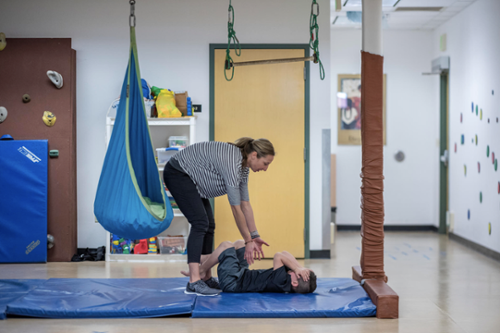CME Autism Clinic Helps Children Develop Helpful Skills
 Mason, diagnosed on the autism spectrum, is in the middle of his Autism Motor Clinic session with Carli Ross, a kinesiology lecturer and a clinician at Chico State’s Autism Clinic. As part of the University’s Department of Kinesiology and its Adapted Physical Education (APE) option, the clinic is a service-learning program that pairs clinicians with children who have autism in a personal one-on-one setting.
Mason, diagnosed on the autism spectrum, is in the middle of his Autism Motor Clinic session with Carli Ross, a kinesiology lecturer and a clinician at Chico State’s Autism Clinic. As part of the University’s Department of Kinesiology and its Adapted Physical Education (APE) option, the clinic is a service-learning program that pairs clinicians with children who have autism in a personal one-on-one setting.
“Every kid is so different,” said Mason’s mom, Cassy Comages. “What’s so amazing is that the program builds each session specifically for the kid that they’re working with. And they just keep getting pushed and they have goals that they work on.”
Kinesiology faculty Rebecca Lytle started the Autism Clinic inside Yolo Hall in 2003, providing children on the autism spectrum with a safe place to be active and to call their very own—and one designed to maximize learnings.
Since then, Lytle has led the clinic to expand its services to include the Autism Motor Clinic (for children ages 2–13), Teen Group (with a focus on social development and life skills that also includes a food lab element), and PEERS (Program for the Education and Enrichment of Relational Skills) for teens and young adults. While similar centers exist in California and across the country, Lytle—who serves as Autism Clinic and APE coordinator—said they are typically connected with a medical facility of some kind. Chico State’s Autism Clinic is unique in this sense, as it is funded by the Far Northern Regional Center, an agency that serves those with developmental disabilities in nine North State counties.
Lytle said that while the Far Northern Regional Center covers most of the cost to use the Autism Clinic most families, no family is turned away due to cost. Additionally, the clinic accepts donations at its Autism Clinic donation account, which helps to purchase extra equipment and fund summer programming.
